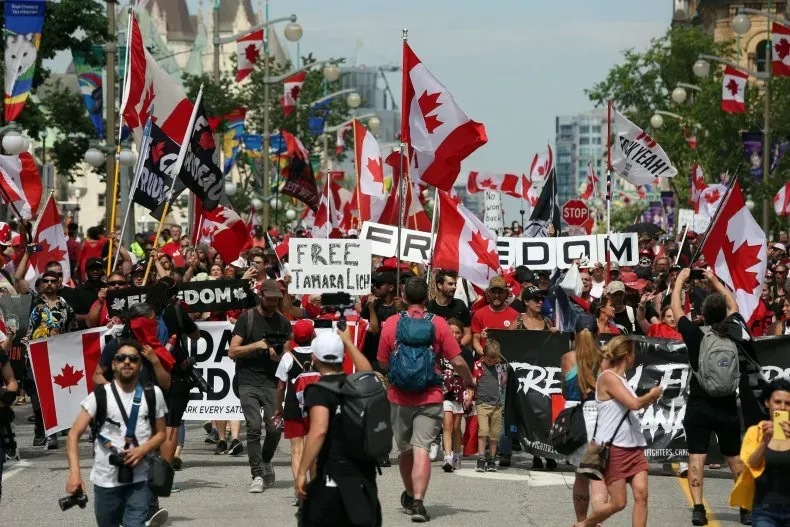Table of Contents
Thomas Klassen
The trial has begun for two major leaders of the Freedom Convoy that occupied parts of Canada’s capital in early 2022. Two organizers, Tamara Lich and Chris Barber, are charged with mischief, obstructing police, counselling others to commit mischief and intimidation.
At the same time, in the United States, former Proud Boys leader Enrique Tarrio has been sentenced to 22 years in prison for his role in the Jan. 6, 2021 ‘insurrection’ on Capitol Hill. Several others involved in that uprising have also received long prison terms.
The trials and sentencing hearings connected to these events are being closely watched because they raise questions about the way citizens can express dissent and protest in democracies.
Stoked by politicians
The importance of the criminal trials — and in the U.S., the ongoing appeals process as well — extends beyond the fate of the people before the courts. The protests, and in some cases the violence, were partly instigated and encouraged by politicians.
In Canada, Erin O’Toole, then the leader of the Conservative Party of Canada, met with truckers as they travelled to Ottawa. Current leader Pierre Poilievre has also been supportive of Freedom Convoy protesters.
In the U.S., defeated President Donald Trump has been accused of inciting the crowd of supporters who sacked the Capitol.
He faces no criminal charges specifically for the riot — the U.S. Senate refused to impeach him for “incitement of insurrection” — though he has been indicted for his alleged broader efforts to overturn the 2020 presidential election.
The events in both Canada and the U.S. continue to shape politics in the two countries.
Prosecutors in the U.S. have relied on the little-used charge of seditious conspiracy to obtain long prison terms (that are or will be appealed). Even those not physically present at the violence, including Tarrio, have been sentenced to decades-long prison terms.
In Canada, the Freedom Convoy, although far less violent, was not as spontaneous as the siege of the Capitol. It was organized over the course of several weeks. Neither the organizers nor law enforcement officials were prepared for how many would ultimately arrive in the nation’s capital or for how long they would remain.
Is incitement illegal?
Lich and Barber have opted for a judge-alone trial in Ottawa, which is common when a case elicits strong views among the population.
They are charged with encouraging people to travel to Ottawa and remain there, in defiance of police orders. Yet it’s by no means clear that offering such encouragement is illegal.
Given the nature of the charges in the U.S., prosecutors have sought maximum sentences; that’s a possibility in Canada as well in the event that Lich and Barber are convicted. This might be a way to reduce the odds of other groups or individuals staging similar events in the future.
Yet protest is a fundamental feature of democracies, and they’re not always peaceful and planned. At times they spiral out of control and can threaten the existing order.
The United States, after all, was created via non-peaceful means by citizens who battled their own government.
Canada, with its history of evolution rather than revolution, is not fertile ground for violent protest. Consequently, many Canadians viewed the chaotic blockade in Ottawa, and the state’s inability to respond to it for several weeks, to be almost as shocking as the violence and looting in Washington.
Court decisions in both countries seem likely to restrict the scope of action for future protesters. The threat to the existing order is one that governments, security agencies and the courts take very seriously. This applies as much in a democracy as in any other form of government.
Emergencies Act changes?
In Canada, the Liberal government is reviewing changes to the Emergencies Act designed to better deal with future events that require broad government intervention. No specific amendments have been announced, but it’s likely they’ll increase the ability of the state to intercede when protests spiral out of control.
In the U.S., with a political culture that stresses individual freedom, the long-term implications of the Jan. 6 trials and sentencings are unclear.
If Trump, facing several criminal indictments, manages to return to the White House, his supporters may regard the attack on the Capitol as being successful and justified. If Trump fades, perhaps embroiled in the court cases that dog him, so might those who rioted.
But on both sides of the border, politicians in power should be much more wary about creating conditions that foster violent protests, marches or other forms of popular dissent. Security agencies certainly are.
In Canada, some of the genesis of the Freedom Convoy was also due to political and administrative missteps in vaccine mandate communications and enforcement.
Hopefully, the current criminal proceedings will lead to a considered examination of how citizens can protest legally — and to what extent those protests can tread into non-legal territory without incurring the full wrath of the state.
This article is republished from The Conversation under a Creative Commons license. Read the original article.









